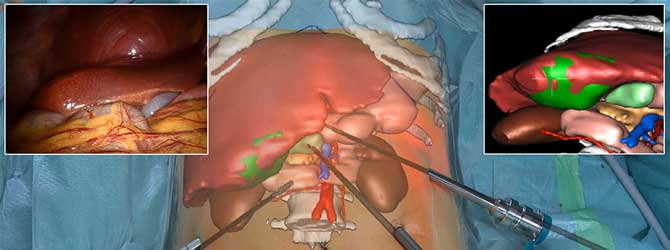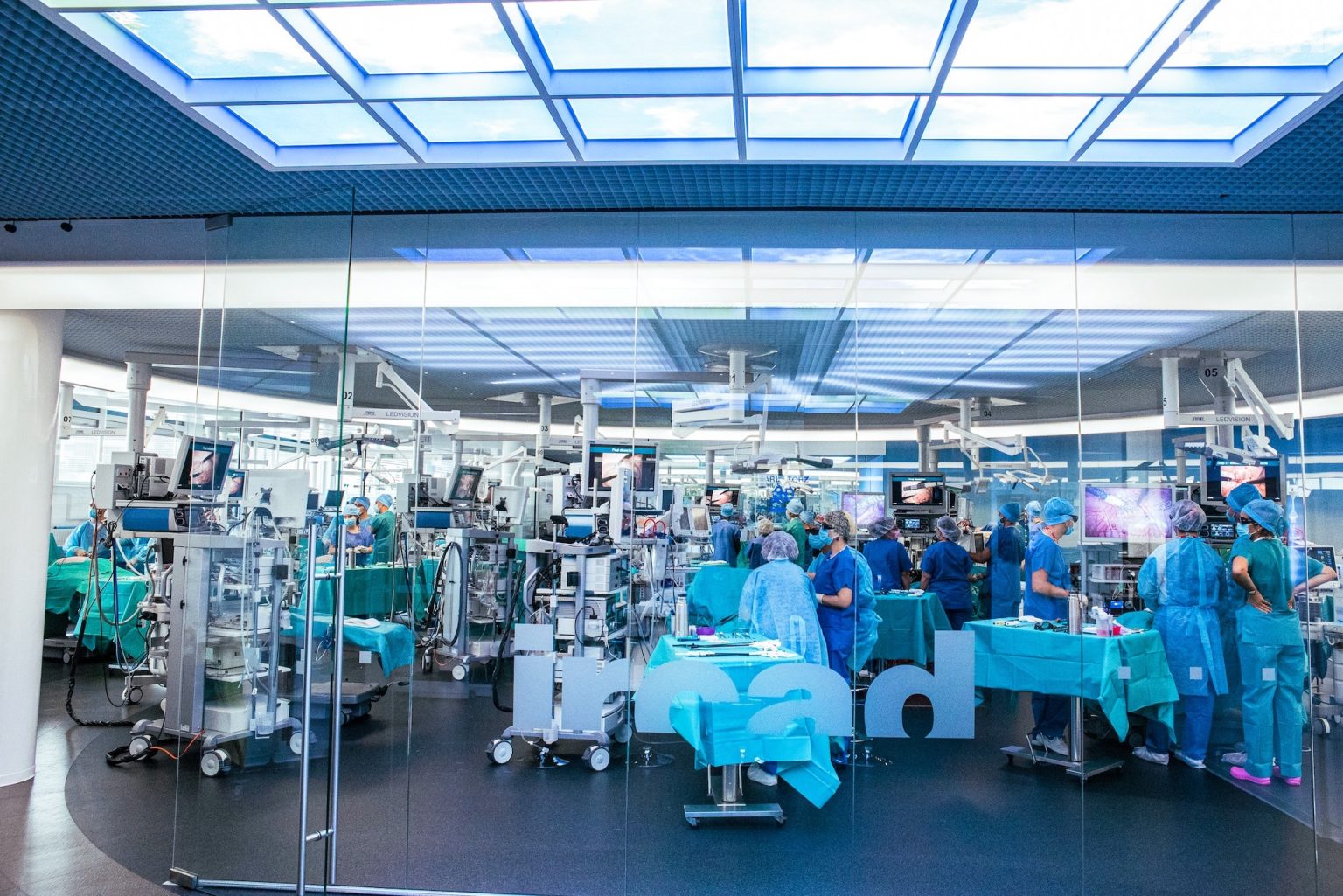
Less than a year after its creation within the framework of the Investment for the Future Program (Programme des Investissements d’Avenir), the Hospital-University Institute of Strasbourg (IHU) “Institute of Image-Guided Minimally Invasive Surgery”, in cooperation with the Research Institute against Digestive Cancer (IRCAD), has achieved four surgical firsts, three world firsts and one French first, resorting to entirely minimally invasive and image-guided hybrid surgery techniques.
These four interventions have earned international acknowledgment through the publication of articles in prestigious journals (New England Journal of Medicine, Archives of Surgery, Surgical Innovation).
Download press release (French)

Thanks to the combination of all available techniques, her tumour has been resected through “augmented reality”-guided robotized surgery. Augmented reality consists in using virtual reality images and merging them in real-time during surgery with real images provided by the camera that has been inserted into the patient’s body.
After deformation simulation of the abdominal wall, the positioning of surgical instruments has been defined, then “augmented reality” has been integrated in the stereoscopic camera of the robot. The constant interaction between the surgeon and a computer engineer allowed for visual navigation inside anatomical structures, making the liver transparent so as to see all the blood vessels which are usually invisible.
“The course of events perfectly illustrates the hybrid surgery concept. Simulation of all the steps before their execution, provides the basis for a protocol that will become mandatory in the coming years for any complex surgical manoeuvre” reckons Professor Jacques Marescaux, main author of these four firsts and chief executive officer of the IHU.

These first achievements reflect the spirit of the IHU, which aims at giving patients access as soon as possible to therapeutic innovations, for an ever less invasive surgical treatment.
They also show the wish of technology transfer through which medical technological innovation has not to be considered as a cost increase but as growth dynamics in a country’s economy.
Located at the heart of a reference hospital-university site, the IHU Strasbourg benefits from a strong French-German partnership as well as from the success of the Research Institute against Digestive Cancer (IRCAD) which is worldwide renowned for its teaching and research activities in the field of surgery.
Institute of excellence for clinical and experimental research, its mission is to develop hybrid surgery, radically innovative, which will be entirely minimally invasive and image-guided. As a centre of innovation, it is a powerful tool for the economic valorisation of the products of research and at the forefront to accelerate the development of a new French industrial sector in the field of medical technologies.

The IHU Strasbourg is a scientific cooperation foundation set up by Ministerial Decree of 25 November 2011 within the framework of the Investment for the Future Program. This foundation has been created by IRCAD, the Strasbourg University Hospital, the University of Strasbourg, ARC, INRIA, the Karl Storz company and the Fédération Centre Est des Crédits Mutuels.
Among the six IHUs selected by an international jury, out of 16 candidates, the IHU Strasbourg has been ranked first ex-aequo laureate with the IHU Marseille and the IHU Imagine from Paris. The IHU Strasbourg promotes two original features: it is the only IHU in the field of surgery and it relies on a strategic French-German industrial partnership.
The IHU Strasbourg develops a revolutionary surgical discipline that combines the expertise of surgeons, gastroenterologists and radiologists: “image-guided minimally invasive hybrid surgery”.

This surgery is being developed within latest generation hybrid operating rooms which use the latest technological innovations and which form part of a truly new concept of an intelligent hospital and which should become a standard. The objective is to propose quality care, for improved patient benefit, with a professed desire of optimizing and cutting healthcare costs.
Centre of excellence, the IHU Strasbourg has been able to attract international opinion leaders, practitioners and researchers to join its operational teams, its groups of experts and its governing bodies.
By 2020, the IHU Strasbourg considers generating 2.000 highly qualified new jobs thanks to the establishment of about ten R&D centres of major companies, the development of the activity of French medium-sized companies and the creation of about one hundred innovative start-up companies.
Don’t miss the latest news from IRCAD.
Sign up here for our newsletters and communication mailings
to stay informed about us and our courses

Please note that the IRCAD administrative board and staff are closely monitoring the evolving COVID-19 situation, in full compliance with all applicable laws and regulations in France. The health, safety, and well-being of our participants, experts and staff are our top priority!
Despite the current context, the IRCAD stands firmly by your side to help you acquire knowledge and skills. Come and join us !
We would like to draw your attention that the « Vaccine Pass » is now mandatory in France since end of January 2022 and replaces the former « Health Pass » to access places that are open to the public, such as cinemas, museums, cafés and restaurants, hotels as well as the IRCAD Institute which welcomes participants in the framework of its courses and seminars. Thus, a PCR test without vaccination is no longer sufficient to take part in our courses.
The vaccine pass includes a proof of the following (one of the 3 items is sufficient):
Further information about the new vaccine pass can be found at :
We very much hope to be able to count on your kind understanding of those rules which have been set by the French Government and which our Institute is required to apply